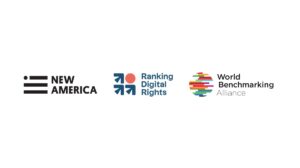
In 2022, for the first time, Ranking Digital Rights divided its flagship Corporate Accountability Index—which, since 2015, has evaluated the world’s most powerful digital platforms and telcos on their respect for human rights—into two, becoming the Big Tech Scorecard (BTS) and the Telco Giants Scorecard (TGS). This allowed RDR to place a particular, and much-needed, spotlight on the role of telcos in either protecting or enabling our digital rights.
As we’ve noted, digital platforms often receive far greater attention, including from the media. But telcos are just as likely to perpetuate harmful violations of user rights. And in many parts of the world, they also wield vastly more power. This stems from both their much closer relationship with governments as well as from being the primary means of accessing the internet. In other words, telcos are veritable gatekeepers of the web. Their power is especially notable when they are government-owned and/or operate in authoritarian or authoritarian-leaning countries.
One of the most severe manifestations of how they can wield their power to curtail rights is through the imposition of network shutdowns. Other potential violations include receiving, and responding to, requests for censorship, as well as handing over data to authorities or other third parties that is more detailed than the data obtained by platforms. This may include users’ communications as well as demographic, location, and billing data. In fact, the ability to acquire this data has given telcos a newfound interest and ability to carry out potentially harmful targeted advertisement. Despite these potential risks, and higher susceptibility to government demands, our inaugural Telco Giants Scorecard (TGS) found that telcos are, on a whole, less transparent, earning lower scores than their Big Tech peers.
Despite Laggards, Some Telcos Continue to Improve on Human Rights
But in spite of overall disappointing scores for many companies that have stuck to the status quo, three companies RDR evaluates, and has engaged with, have continued to improve. These include Spain-based Telefónica, which earned the top score at 57% in our 2022 TGS. Though it has led the pack since 2019, this grade was up from 49% during the last Corporate Accountability Index in 2020. It achieved this new grade due, in large part, to expanded human rights risks assessments and new disclosures sharing that it does not comply with private requests for censorship or user information.
Meanwhile, two companies headquartered in the Global South, South Africa-based MTN and América Móvil, headquartered in Mexico, increased their scores from 23% and 22% in 2020 to 34% and 32%, respectively, in 2022. These increases allowed them to leap ahead of Orange, with MTN becoming the first emerging market company to make it into our top six. Both companies cited RDR’s standards as pivotal, inspiring new transparency reporting that they both conducted for the first time, becoming the first companies to do so in Africa and Latin America. These reports offered explanations of processes for managing government demands for shutdowns, censorship, and demands for user information, all critical areas for transparency from the telecom sector.
How RDR Engages With These Telcos to Bolster Digital Rights Globally
To better understand how RDR’s direct engagement with companies has helped compel positive changes in company policy, RDR spoke directly with representatives from the three telco giants. Carlo Manuel Drauth is Head of Responsible Business and Human Rights at Telefónica, which sits atop our rankings. For those who, like him, operate within the sustainability department of a large telecom multinational, RDR’s evaluations and recommendations are a critical piece of data that he can point to when communicating on the need for human rights-based policy changes. “It always helps if you have an internationally accepted benchmark on how to manage potential digital rights impacts and you can show internally that these issues are material to the broader stakeholder community,’” he explains. It helps that many companies know and understand that RDR represents a range of stakeholder interests, from civil society to investors.
Two advantages of RDR’s work appear to particularly stand out to companies’ human rights representatives: a deeply rigorous methodology, combined with an easy channel for communication. América Móvil explained that working with RDR, and examining the company’s scores along each indicator, has helped them to better communicate internal policies and best practices to the public. Carlo Drauth at Telefónica agrees. Though Telefónica is working with numerous other indices and analyses, he believes that RDR’s “scientific rigor is unparalleled” and provides an evidence-based tool for stakeholder interactions on digital rights.
América Móvil points as well to the company engagement RDR carries out after our evaluation, including RDR’s “fluid communication channel,” the chance to review pre-scoring, and the insights RDR subsequently provides about potential avenues for improvement through our follow-up process. América Móvil, like many companies, appreciates RDR’s “race to the top” approach. As they explain, “it helps that you can see your peers’ ratings through time, but you can also see your peers’ ratings throughout time and by topic, facilitating the identification of priorities and areas of opportunity. Being able to see when peers get a jump in their score also helps push for internal shifts which fortunately have been reflected on the company score.” Ncumisa Willie, Senior Manager for Digital Human Rights at MTN—the company whose score rose the most in the 2022 Telco Giants Scorecard—agrees. “It’s great when you see that you are improving and you see your scores. It motivates you to go back and realize that actually you want to do more and more,” she explains.
Indeed, as mentioned, pressure on human rights from RDR has translated into measurable improvements in policy and processes. RDR provided impetus for MTN’s decision to conduct new human rights impact assessments. Meanwhile, América Móvil points directly to RDR as a major inspiration for the company’s first-of-its-kind transparency report. Carlo at Telefónica highlights the company’s principles on artificial intelligence, the first of its kind when it was published in 2018, which was previously brought up by RDR. Though these principles existed internally, RDR provided a main impetus and encouragement to develop a governance structure for implementation. RDR’s indicators also provided a blueprint for the development of Telefónica’s Global Transparency Center, where customers and other stakeholders can find information on policies related to privacy, security, and freedom of expression. For Carlo at Telefónica, RDR’s Index functions as a “sort of north star,” either confirming that the company is headed in the right direction, or else acting as a “corrective measure” when they aren’t.
At RDR, we believe that, though our standards for rights-respecting policies and transparency may be high, they’re also achievable. Furthermore, they are necessary if we are to protect human rights, while new risks and harms emerge as novel technologies are rolled out. They are also essential for telcos, whose ability to help governments usurp the rights of those living under difficult socio-political conditions, including authoritarianism, has, for too long, been underestimated. Though each and every telco we rank, including these three, has a long way to go to better protect human rights, Telefónica, América Móvil, and MTN have demonstrated the strides, and score improvements, that are nonetheless possible when companies take seriously both the risks and the ensuing responsibilities that our standards highlight.




